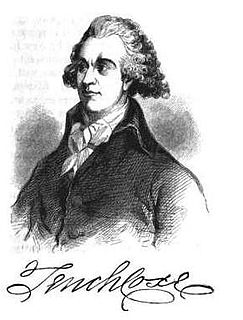A Quote by Thomas Paine
Virtue is not hereditary.
Quote Topics
Related Quotes
As our president bears no resemblance to a king so we shall see the Senate has no similitude to nobles. First, not being hereditary, their collective knowledge, wisdom, and virtue are not precarious. For by these qualities alone are they to obtain their offices, and they will have none of the peculiar qualities and vices of those men who possess power merely because their father held it before them.
Spirituality is not a question of morality, it is a question of vision. Spirituality is not the practising of virtues - because if you practise a virtue it is no longer a virtue. A practised virtue is a dead thing, a dead weight. Virtue is virtue only when it is spontaneous; virtue is virtue only when it is natural, unpractised - when it comes out of your vision, out of your awareness, out of your understanding.
These, then, are the four kinds of royalty. First the monarchy of the heroic ages; this was exercised over voluntary subjects, but limited to certain functions; the king was a general and a judge, and had the control of religion The second is that of the barbarians, which is a hereditary despotic government in accordance with law. A third is the power of the so-called Aesynmete or Dictator; this is an elective tyranny. The fourth is the Lacedaemonian, which is in fact a generalship, hereditary and perpetual.
In the first part of 'Rights of Man' I have endeavoured to show...that there does not exist a right to establish hereditary government...because hereditary government always means a government yet to come, and the case always is, that the people who are to live afterwards, have always the same right to choose a government for themselves, as the people had who have lived before them.
The power of perpetuating our property in our families is one of the most valuable and interesting circumstances belonging to it, and that which tends most to the perpetuation of society itself. It makes our weakness subservient to our virtue; it grafts benevolence even upon avarice. The possession of family wealth and of the distinction which attends hereditary possessions (as most concerned in it,) are the natural securities for this transmission.
And what does reward virtue? You think the communist commissar rewards virtue? You think a Hitler rewards virtue? You think, excuse me, if you'll pardon me, American presidents reward virtue? Do they choose their appointees on the basis of the virtue of the people appointed or on the basis of their political clout?
'Hereditary' is unabashedly a horror film, whereas 'It Comes at Night' was a lot of things: it was a thriller; it was a postapocalyptic drama. It was a slow-building, very dark movie about relationships. 'Hereditary' is also about relationships, and I hope it functions as a vivid family drama, but it is also very much a horror film.
There is, however, no advantage in reflections on the past further than may be of service to the present. For the future we must provide by maintaining what the present gives us and redoubling our efforts; it is hereditary to us to win virtue as the fruit of labour, and you must not change the habit, even though you should have a slight advantage in wealth and resources; for it is not right that what was won in want should be lost in plenty.
lf the attribute of popular government in peace is virtue, the attribute of popular government in revolution is at one and the same time virtue and terror, virtue without which terror is fatal, terror without which virtue is impotent. The terror is nothing but justice, prompt, severe, inflexible; it is thus an emanation of virtue.

































